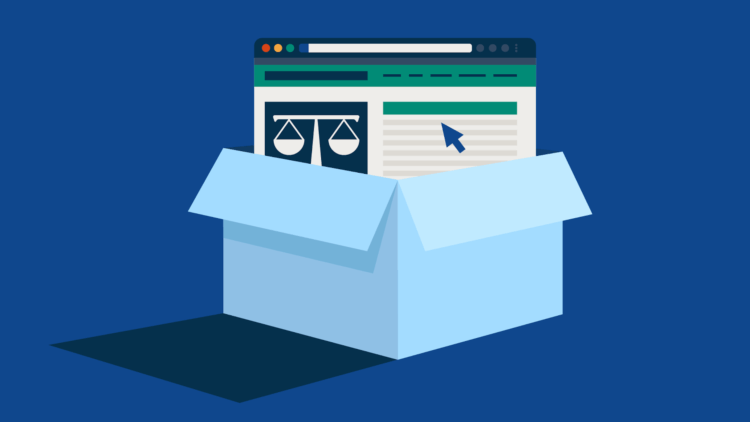Your attorney website is more than a checkbox. It’s your firm’s first impression for clients, a critical component of your marketing strategy, and a key tool for establishing credibility. A Google Consumer Survey found that 96% of potential clients turn to search engines for legal advice, making a well-designed website essential for attracting new business and staying competitive. So, whether you’re revamping your current site or creating one from scratch, you might be wondering: How much are attorney websites?
In this guide, we’ll break down the range of costs—from basic to custom designs and everything in between. We’ll also share tips to help you get the most out of your investment, including cost-effective tools like Clio’s law firm website builder.
Looking to boost your firm’s online presence? Use Clio Grow to tackle your firm’s website, client intake, calendaring, and more so you can focus on growing your business–Book your Clio demo today.
What is the average cost of building an attorney website?
The cost of building an attorney website ranges from $15 per month for a DIY option to over $20,000 for a custom-designed site from an agency. The final price varies based on factors like the website’s size, required functionalities, and level of customization.
A breakdown of attorney website costs
Before designing your website, you’ll want to make sure it fits within your law firm’s budget. The good news? You have a range of options, each with different benefits. Understanding these will help you make informed decisions and find a solution that meets your needs. Below, we break down the most common types of attorney websites and their average costs.
Basic template sites
- Average cost: $15 – $100+ per month
- What you’ll get: Basic template sites are a cost-effective solution for firms with tighter budgets, including solo practitioners and small firms. These sites use pre-designed templates that can be customized with your branding and content. They’re a fantastic way to build an online presence without breaking the bank.
Custom designed sites
- Average cost: $3,000 – $20,000+
- What you’ll get: Custom-designed sites offer a more tailored approach, with bespoke graphics, custom layouts, and personalized features that match your firm’s identity. While they offer a distinctive look and enhanced functionality, they often come with a longer development timeline and a higher price tag.
Premium features
- Average cost: $5,000 to $10,000+
- What you’ll get: Premium sites offer advanced functionalities such as client portals, live chat support, and high-end visual elements. These features enhance the user experience and set your firm apart with sophisticated and engaging functionalities.
If you’re looking for an easy-to-edit attorney website template, check out this post: Top 5 Attorney Website Templates: Build a Professional Website.

Factors affecting the cost of attorney websites
Once you’ve selected the type of site that fits your firm’s needs, you’re off to a solid start. But before you dive into the design process, it’s crucial to understand the many factors that can influence the final cost of attorney websites—which can run anywhere from a few hundred to several thousand dollars. Here are some key considerations to keep in mind.
- Design complexity. The more intricate and customized the design, the higher the cost. For example, a basic website designed by an agency might cost around $3,000, while a fully custom site with unique layouts and interactive features can easily exceed $10,000.
- Functionality and features. Basic features are less expensive, while sophisticated ones require additional development and integration. Integrating advanced features like live chat or e-commerce functionality can range from $1,500 to $5,000 or more, depending on the complexity and customization required.
- Number of pages. More pages mean more content to design and integrate—adding to the development time. A typical law firm site might include a home page, about us, practice areas, attorney profiles, blog, and contact us. Pages with advanced features or interactive elements will likely cost more. Each additional page could add about $100 to $200 to your budget.
- Content creation. Law firm website content creation can also add to the price, especially if you hire a professional. Partnering with a writer to produce SEO-friendly copy can add between $1,000 and $3,000+ to your overall cost.
- Search Engine Optimization (SEO) and marketing services. SEO improves your site’s search engine ranking—while marketing services range from social media integration to email campaigns. These services can impact your cost but are a powerful way to drive traffic to your site. Basic SEO can cost a few hundred dollars, while more extensive services may exceed several thousand.
- Hosting, maintenance, and updates. After your site goes live, you’ll have ongoing costs for hosting, maintenance, and updates. Hosting fees can range from a few dollars to $250 per month, and domain names typically cost around $20 per year. Maintenance is crucial for keeping your site secure and up to date, with annual fees ranging from $250 to $1,000+.
- Online payment capabilities: Adding e-commerce capabilities to your site can vary in price, but this payment method does not often align with a law firm’s payment structure, becoming a wasted additional cost or an irrelevant feature. Thankfully, with tools like Clio Payments, law firms can securely accept online payments from clients and stay in compliance with trust accounting rules without having to pay for website e-commerce features. Best of all, this feature is included in all Clio Manage subscriptions.
Can I start with a basic website and upgrade later?
Absolutely. Starting with a basic website lets you establish an online presence. You can always upgrade it as your firm grows or needs change, adding advanced features and design elements over time.
You may like these posts
Additional considerations for law firm website design cost
Beyond the basics, several additional factors can influence the overall cost of your attorney website. These include:
- Responsive design and mobile optimization. With more clients than ever using smartphones and tablets, a responsive website that adjusts to different screen sizes is essential for a smooth experience. The cost for responsive design and mobile optimization typically ranges anywhere from $500 to $2,000.
- User experience (UX) and navigation. A user-friendly UX and intuitive navigation keep clients engaged and make it easy to find exactly what they need. A well-designed site features clear calls to action, logical layouts, and user-friendly menus. Effective UX design can add around $1,000 to $3,000 to the project.
- Integration with legal practice management systems. Seamless integration with legal software like Clio can offer built-in tools that let you connect with clients, collect payments, and manage everything from one central place.
Options for building an effective law firm website
Designing an effective law firm website comes with a host of considerations. You have several options, each offering unique advantages and factors to weigh. Next, we’ll take a closer look at some of the popular options for attorney websites and their costs—along with benefits and potential drawbacks to know.
DIY website builders
Average cost: $15 – $100+ per month
Wix, Squarespace, and WordPress.com are among the do-it-yourself website builders that provide incredibly user-friendly platforms. For an affordable monthly fee, they allow you to create and manage your site—without needing extensive technical skills.
Pros:
- Cost-effective: Cheaper than hiring a professional or using a custom design service.
- Ease of use: Drag-and-drop interfaces and pre-designed templates make it accessible for users with limited technical expertise.
- Quick setup: Can be up and running quickly.
Cons:
- Limited customization: While you can customize templates, there are limitations.
- Scalability issues: May not scale well if your needs grow or if you require advanced functionalities.
- Support: Basic support is often included, but more complex issues may require additional assistance.
Advanced customization platforms
Average cost: $100 – $500+ for initial setup
WordPress.org, Shopify, Squarespace (with developer tools) and GoDaddy Website Builder (with advanced plans) offer law firms the option to have a self-hosted website, or a managed website, allowing more scalability and flexibility. These options provide a balance of ease of use and customization for users looking for more control and a professional feel without the cost of a full design agency. It’s an ideal option for law firms that want full control over their website’s design, functionality, and content management.
Pros:
- Highly customizable: Choose from thousands of themes and plugins for extensive customization.
- Scalable: Suitable for law firms of any size, with the ability to add complex features as your firm grows.
Cons:
- Requires some technical knowledge: While many aspects are user-friendly, it helps to know basic coding or be willing to hire a developer for advanced features.
- Ongoing maintenance: Regular updates for themes and plugins are necessary, along with occasional troubleshooting.
Professional web design agency
Average cost: $5,000 – $20,000+
Partnering with a professional law firm web design company provides a comprehensive, customized approach to building your law firm’s website. These agencies offer expertise in everything from logo design to marketing and search engine optimization.
Pros:
- Custom design: Tailored to your firm’s unique branding and requirements.
- High quality: Professional agencies deliver polished designs with advanced functionalities.
- Full service: Typically includes ongoing support, maintenance, and SEO services.
Cons:
- Higher cost: More expensive than DIY options or template-based solutions.
- Longer development time: Custom projects may take more time to complete.
- Complex process: The process can be more involved and require more input from your team.
Legal-specific website builders
Average cost: Often included in legal software packages like Clio’s Complete subscription.
Legal-specific website builders, such as Clio’s law firm website builder, have been designed with the unique needs of law firms in mind. These platforms offer specialized features tailored to legal practices.
Pros:
- Industry-focused: Includes features and templates specifically designed for law firms.
- Ease of use: Intuitive for legal professionals with minimal tech experience. Plus, solutions like Clio handle desktop and mobile optimization—so your site looks great across devices.
- Essential features included: Integrates online appointment bookings, client intake forms, and the client-attorney portal directly to your site, allowing clients to securely pay bills, send messages, and upload documents.
- Cost-effective: With Clio, law firm websites are included in the Clio Complete subscription at no additional cost.
Cons:
- Standardized design: While tailored to legal needs, designs may be less unique compared to custom solutions.
Hiring a freelance web designer
Average cost: $1,000 – $5,000+
Hiring a freelance web designer offers a more personalized approach than DIY platforms and can be more affordable than agencies.
Pros:
- Custom work: Freelancers can create a website tailored to your specific needs and preferences.
- Flexibility: More direct communication with the designer for changes and updates.
- Cost: Typically, less expensive than working with an agency.
Cons:
- Limited resources: A freelancer may not offer the same range of services as an agency, such as comprehensive SEO support.
- Project management: You may need to manage the project more closely.
- Limited website maintenance: A freelancer may not offer ongoing maintenance, if they do, it would come at an additional cost.
Hybrid approach
Average cost: $1,000 – $5,000+
A hybrid approach combines elements of DIY website builders with professional design services. For example, you might use a DIY platform but hire a designer to customize the template or add advanced features.
Pros:
- Balanced cost: Offers a compromise between the low cost of DIY and the high quality of professional design.
- Customization options: Allows for a mix of template-based and custom features.
- Flexibility: Can be tailored to meet specific needs without the high cost of a fully custom site.
Cons:
- Complex coordination: Requires managing both the DIY platform and the designer, which can be more complex.
- Varied quality: The final product may vary depending on the execution of the hybrid approach.
Is it worth investing in a high-end website for a law firm?
A high-end website can enhance your firm's credibility, attract clients, and offer advanced features that improve their experience. It’s a valuable investment for standing out in a competitive market and providing a professional online presence.
Tiered pricing models
Many agencies offer tiered pricing models. These models enable firms to select a package tailored to their specific needs and budget. Here’s an overview of typical tiers, their features, and benefits:
1. Low-tier package
Average cost: $1,000 – $3,000
Includes: Basic design, template customization, essential features like contact forms, fundamental SEO setup, and up to 5 pages. Ideal for small firms or personal websites with straightforward needs.
2. Mid-tier package
Average cost: $3,000 – $7,000
Includes: Custom design elements, additional pages (up to 15), enhanced functionality such as live chat integration, moderate SEO services, and mobile responsiveness. Suitable for firms needing more personalization and interactivity.
3. High-tier package
Average cost: $7,000 – $15,000+
Includes: Fully custom design, advanced features such as e-commerce, client portals, or booking systems, comprehensive SEO optimization, ongoing support, and maintenance. This package is suited for larger firms that require complex features and high-performance sites.

Tips for getting the most value out of your investment
Investing in a professional website for your law firm is a major step. To make sure you get the best return on investment, you’ll want to approach it strategically. These five tips will help you do just that.
- Define your goals and target audience. Define your objectives and target audience to guide your site’s design, content, and features. Here are several questions to ask for a better law firm website.
- Choose the right partner. A skilled web designer or agency can turn a lackluster website into a standout one. Choose a web designer or agency with experience in law firm sites and a proven track record.
- Enhance the user experience. Make your site easy to navigate, visually appealing, and ensure key actions are accessible.
- Optimize for search engines. Boost visibility by using relevant keywords, updating content regularly, and focusing on local SEO.
- Track Performance. Use tools like Google Analytics to monitor traffic and identify areas for improvement.
The importance of investing in a professional website for attorneys
We’ve talked a lot about some key factors of attorney websites and the costs, but why is it worth the investment? Simply put, a professional website is an essential tool for establishing and growing your law firm’s online presence. Here’s why having a well-designed website has become more important than ever for attorneys:
Builds trust from the beginning
In today’s competitive legal market, your website often serves as a potential client’s first impression of your firm. A professional, well-crafted website helps establish credibility and build trust, making it more likely for them to choose you over your competitors.
Boosts your firm’s online presence
A professional website boosts your online visibility, making it easier for potential clients to find you through search engines. By implementing effective SEO practices, your site can rank higher in search results, increasing your firm’s reach. Improved visibility allows you to connect with a wider audience seeking legal services.
Enhances client attraction and engagement
A well-designed website is crucial for attracting and engaging clients. With user-friendly navigation, clear calls to action, and accessible contact options, your website ensures that potential clients can easily find and connect with you. Features like online appointment scheduling and live chat enhance accessibility and keep visitors engaged.
Showcases your expertise
Your website is a powerful platform to showcase your expertise and specialization. Highlight your practice areas, share case studies or client testimonials, and provide informative content that demonstrates your knowledge and experience. A professional website allows you to position your firm as an authority in your field, attracting clients who need specialized legal services.
The final word on attorney websites
An attorney website is a powerful tool for telling your firm’s story. Investing in a high-quality website enhances your online presence, strengthens your brand, and attracts new clients. By understanding the different costs and options, you can choose a solution that fits your budget and needs. Whether you opt for a DIY builder, a professional agency, or a legal-specific platform, you’re investing in a tool that can drive your firm’s long-term success.
Ready to build or upgrade your attorney website? Clio’s Law Firm Website Builder offers robust tools, seamless integration with legal practice management software, and exceptional customer support to make your website journey smoother than ever. Book your Clio demo today to discover what it can do for your firm!
How long will it take to get my firm's new website up and running?
Launching a new law firm website can usually take anywhere from a couple of weeks to several months or longer. This includes the design, development, and testing phases. The complexity and customization involved may affect the duration.
What ongoing costs should I expect after the website is built?
Ongoing costs include domain registration, web hosting, website maintenance, security updates, and potential content updates or SEO services.
We published this blog post in September 2024. Last updated: .
Posted in: Marketing









